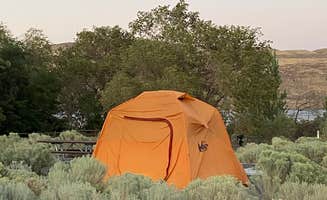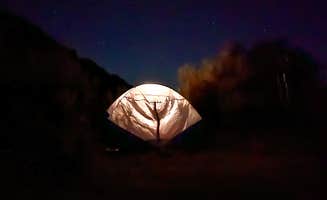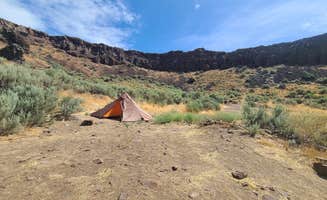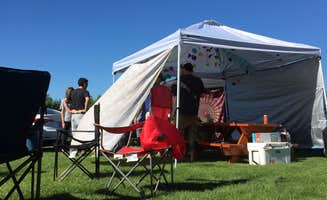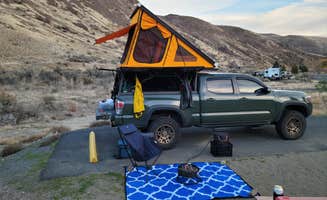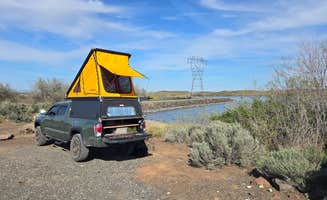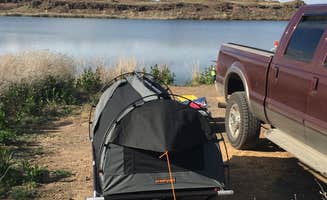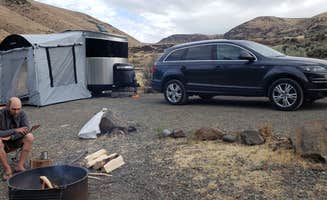Dispersed camping spots near Mattawa, Washington spread across the Columbia Basin's dry, arid terrain at elevations between 400-800 feet. Summer nighttime temperatures drop significantly from daytime highs, sometimes creating 30-degree temperature swings. Rocky terrain dominates the camping areas, with limited vegetation except near water sources where wildlife becomes more concentrated.
What to do
Explore petrified wood remains: At Ginkgo Petrified Forest State Park Campground, visitors can examine preserved ancient tree specimens along an interpretive trail. "An easy 1.5 mile hike will take you past several nicely preserved examples of different types of petrified wood, including some whole logs where you can clearly still see the shape of the bark, rings, etc," notes reviewer Meghan O.
Watch for wildlife: The arid landscape transitions to richer ecosystems near water. "We had a large herd of bighorn sheep as pre dusk visitors which was great to admire," reports Chad L. about his stay at Rocky Coulee Recreation Area.
Enjoy water recreation: The Columbia River provides swimming opportunities during hot months. At Sand Hollow Campground, "the water access is great for kids - rocky coastline and calm water. We caught one fish and our 9 yr old caught minnows in a lagoon," shares Julie M.
What campers like
Star visibility: The remote locations and minimal light pollution create excellent night sky viewing conditions. "Beautiful sunset and INSANE stargazing," states one camper about Sand Hollow Campground.
Rock climbing access: The basalt formations attract climbers to certain camping areas. At Frenchman Coulee Backcountry Campsites, a reviewer noted it has "AMAZING access to climbing. We have been here 2 x now... staying for about 5 days in a row. It is a 4 minute approach to the nice moderate area called the Feathers and about 15 minutes from other climbs."
Columbia River views: Campsites with river vistas rank highly among visitor preferences. "Very beautiful setting but super windy," writes one visitor about Ginkgo Petrified Forest State Park Campground, highlighting the trade-off between scenery and environmental conditions.
What you should know
Wind conditions: Strong gusts frequently affect camping in the region. A Sand Hollow Campground visitor reports, "It was REALLY windy at night, which made mosquitos not bad and the high temps feel downright pleasant."
Limited facilities: Most dispersed sites offer minimal amenities. "This place does require a Discover Pass, but it's otherwise free. There were portapotties available, but I wouldn't count on them always being available," warns Nicole C. about Vernita Bridge.
Rocky terrain challenges: Access to many sites requires navigating rough roads. "Best to have high clearance as there are some good size rock outcroppings... Best to show up during daylight hours unless you have lots of Baja lights. Many sharp rock outcroppings and difficult terrain to drive over to find a spot," advises jeremy M. about Frenchman Coulee Dispersed Camping.
Tips for camping with families
Look for sites with water access: During hot months, riverside locations provide natural cooling. Julie M. recommends Sand Hollow: "The water access is great for kids - rocky coastline and calm water. We caught one fish and our 9 yr old caught minnows in a lagoon."
Consider handicap-accessible options: Some campgrounds accommodate mobility limitations. Meghan O. points out that at Ginkgo Petrified Forest, "You'll also be close to handicapped parking spaces and have sidewalk access to your campsite, making this a great choice for campers with disabilities or mobility limitations."
Plan for temperature extremes: The region experiences significant day-night temperature variations, requiring proper clothing and gear. One camper at Frenchman Coulee Dispersed Camping advises, "Can get pretty hot here in the warmer months but a beautiful spot to camp if you can avoid the busy/peak times."
Tips from RVers
Select appropriate sites: Not all campgrounds accommodate larger vehicles. At Frenchman Coulee Backcountry Campsites, one RVer warns, "There is not a lot of room for big rigs so I would not suggest staying here If you're 20 + feet long."
Research hookup options: Electric and water connections vary significantly between established campgrounds. At Vantage Riverstone Resort Campground, a visitor notes, "Location has trees, grass, picnic tables, full hook ups, basic and premium rates... It has a boat ramp and 30+ spots large and small."
Consider wind effects on larger vehicles: Strong gusts can impact travel trailers and motorhomes. "The wind was so [bad] we couldn't use our awning or slideout," shares Susan V. about her RV experience at Vantage Riverstone.





